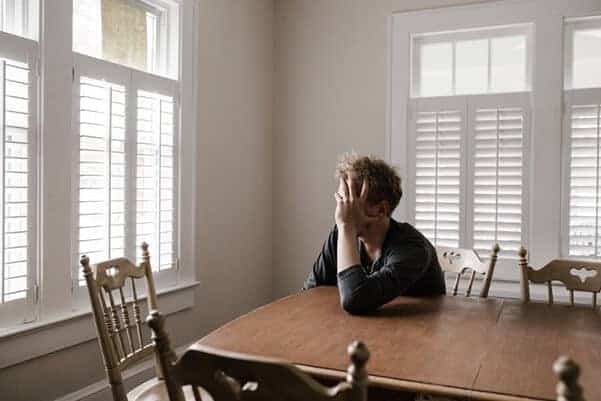Loneliness is a feeling we all have to deal with at some point in our lives, but it is easier than ever to succumb to feelings of isolation and loneliness – even when surrounded by people who love and care for you. It’s a frustrating feeling. You may often find yourself thinking “why do I feel so alone?” and going down a mental helter-skelter of worry and paranoia.
The first thing you need to know is that you are not alone, and although it can be horrible to experience, feeling lonely or isolated is entirely normal. Tackling these emotions and their causes is scary, overwhelming, and something many people cannot do without support. But it is possible, and this guide by Ashes Memorial Jewellery aims to help you get through it.
Causes of loneliness
Let’s start from the beginning and talk about what can cause us to feel lonely. We all live complex lives, and many events can trigger loneliness. According to a 1996 study, these are some main factors that cause you to feel loneliness[i] –
- Unfulfilling relationships – being in a relationship, or even a friendship, that isn’t mentally and physically fulfilling can create feelings of isolation
- Relocations/significant separations – this can be either a physical separation (for example, moving away from a person/people) or an emotional separation (for example, breaking up with a partner or falling out with a friend). This cause also applies when someone passes away.
- Social exclusion – feeling excluded from your community – whether in school, your local area, religious group, or society as a whole, is one of the leading reasons for loneliness.
The statistics
A wide variety of factors can cause loneliness, most of which fall under the sections above. As such, certain groups are more affected than others.
Older people – According to Age UK, In 2016/17 the number of over-50s experiencing loneliness was 1.4 million. This is predicted to increase to a huge 2 million in 2025/6[ii]. They also reported the leading causes for loneliness in over 50s are poor health, feelings of isolation within their neighbourhoods, inability to do what they want, and being widowed or living alone.
Younger people – The ONS (Office for National Statistics) reports that those in the 16 to 24 year-old age bracket were more likely to report ‘often/always’ feeling lonely than older age groups[iii].
Gender – Whilst 14% of older men reported feelings of social isolation compared to 11% of women; women feel lonely more frequently than men according to the ONS (Office for National Statistics)[iv].
Health risks of loneliness
Loneliness impacts our mental health, but it can also have a degrading impact on our physical wellbeing, too[v].
- It increases risk of high blood pressure
- It can increase risk of death by 26%
- It can increase risk of strokes, and the risk of developing heart/coronary disease
- Dementia and overall cognitive decline are more likely in groups that are lonely
Surprisingly, it is believed that loneliness is contagious across friendship groups and social networks[vi].
How to combat loneliness
Now we’ve discussed the facts, lets look at ways you can combat feelings of loneliness when they come up.
Talk & be heard
Talking about how you feel is the best place to start. It’s easy to fall into the mental trap that nobody wants to speak to you or help you when you’re feeling isolated, but this simply isn’t true. Reach out to your family and friends and start a conversation.
If you don’t feel that you have anyone to talk to, or you aren’t comfortable speaking to people you know – there are plenty of places you can turn to. Here are some of these services: –
- Age UK ‘Call in Time’ – this is a weekly friendship call service that will allow you to have a chat with someone new
- The Silver Line – this is a confidential, free helpline that older people can call anytime for a variety of reasons, from advice to just wanting a chat
- Samaritans – when life is difficult, Samaritans are available to talk any time of the day or night
- British Red Cross – the British Red Cross run local loneliness services that will help you to reconnect with your interests, rebuild confidence and meet new people
ITV have compiled a huge list of resources that you can take advantage of during difficult times. You can find this here.
Make new connections
There is a strong link between keeping healthy relationships and the state of your general well-being[vii]. Making new connections or mending bridges with family and friends who you’ve grown apart from is truly difficult, but it will help you massively in the long run.
Joining communities on social media platforms like Facebook and the Nextdoor app, and attending local events like markets can be great places to start. If you’re feeling confident enough, try getting involved in clubs and groups that relate to things that interest you. For example, there could be a running club that meets in a nearby park, or a book club that meet in the local library. Even if you turn up and observe until you feel comfortable, being around others will make a huge difference.
Get out into nature
It’s a fact that going outside and being amongst nature has a positive impact on your health. A report from the WHO (World Health Organisation) states the following –
“Urban green spaces, such as parks, playgrounds, and residential greenery, can promote mental and physical health {…}[viii]”
As well as having an overall affect on your mental state, being in parks amongst families, groups of friends and others who are on their own can make you feel ‘involved’. And who knows, you might strike up a conversation or two.
New hobbies
Despite what you might think, it’s never too late to take up a new hobby. As well as keeping your mind active and occupied, beginning a hobby (or even re-sparking your passion for an old one) can help you to meet others and make connections over a similar interest. A hobby will make you feel more fulfilled and accomplished.
Therapy
Loneliness is often more profound than a surface-level emotion. In many cases, it is caused by deep-rooted issues that manifest as feelings of rejection and isolation. If you’re finding it hard to break down your barriers and resolve your loneliness, it might be worth reaching out to a therapist to see if they can help you on your journey.
The symptoms of loneliness – how to tell when someone needs help
In this day and age it’s so important to look out for our loved ones and to know when they need help; whether they ask for it or not. It isn’t always obvious when someone is feeling lonely as they may be uncomfortable admitting it and could tell you everything is okay to avoid the conversation.
These are some signs or ‘symptoms’ of loneliness to look out for[ix].
- Are they always tired or complaining of feeling fatigued?
- Have they become more ‘materialistic’? Increased levels of shopping and caring more about material possessions could indicate that something isn’t right emotionally, and they are trying to compensate for this
- Do they make a big issue out of nothing? If someone ‘blows up’ over minor inconveniences or seems more stressed than usual – they could just be feeling lonely
- Are they attached to their phone? When people feel alone, their natural instinct could be to get an instant ‘hit’ of socialisation by going on social media. If you notice them spending significantly more time scrolling through their news feeds, take time to check in on them
- Are they spending more time ‘binge-watching’ TV? Watching TV is an easy way to relax at the end of a long day, but it can also be used as a coping technique to ignore negative emotions
If you notice one or more of these signs in someone close to you, gently approach the subject and ask them how they’re doing. Even if they say they’re fine, make more effort to get them involved and help to pull them out of their rut.
Remember that you aren’t alone
Whatever is going on in your life, remember that you aren’t alone. These feelings are temporary and there is a lot you can do to get yourself on the right track again – don’t be scared to reach out and ask for help.
References
Age UK, 2018. All the Lonely People: Loneliness in Later Life. [Online]
Available at: https://www.ageuk.org.uk/globalassets/age-uk/documents/reports-and-publications/reports-and-briefings/loneliness/loneliness-report_final_2409.pdf
[Accessed February 2021].
Cacioppo, J. T., Fowler, J. H. & Christakis, N. A., 2009. Alone in the Crowd: The Structure and Spread of Loneliness in a Large Social Network. [Online]
Available at: https://www.ncbi.nlm.nih.gov/pmc/articles/PMC2792572/
[Accessed February 2021].
Campaign to End Loneliness, n.d. The facts on loneliness. [Online]
Available at: https://www.campaigntoendloneliness.org/the-facts-on-loneliness/
[Accessed February 2021].
Chopik, W. J., 2017. Associations among relational values, support, health, and well‐being across the adult lifespan. [Online]
Available at: https://onlinelibrary.wiley.com/doi/epdf/10.1111/pere.12187
[Accessed February 2021].
Pyle, E. & Evans, D., 2018. Loneliness – What characteristics and circumstances are associated with feeling lonely?. [Online]
Available at: https://www.ons.gov.uk/peoplepopulationandcommunity/wellbeing/articles/lonelinesswhatcharacteristicsandcircumstancesareassociatedwithfeelinglonely/2018-04-10
[Accessed February 2021].
Rokach, A. & Brock, H., 1996. The Causes of Loneliness. [Online]
Available at: https://psycnet.apa.org/record/1997-38711-001
[Accessed February 2021].
Shaw, G., 2018. 9 subtle signs that you’re lonely — even if it doesn’t feel like it. [Online]
Available at: https://www.insider.com/signs-of-loneliness-2018-6
[Accessed February 2021].
WHO Regional Office for Europe, 2016. Urban green spaces and health – a review of evidence (2016). [Online]
Available at: https://www.euro.who.int/en/health-topics/environment-and-health/urban-health/publications/2016/urban-green-spaces-and-health-a-review-of-evidence-2016
[Accessed February 2021].
Sources
[i] https://psycnet.apa.org/record/1997-38711-001
[ii] https://www.ageuk.org.uk/globalassets/age-uk/documents/reports-and-publications/reports-and-briefings/loneliness/loneliness-report_final_2409.pdf
[iii] https://www.ons.gov.uk/peoplepopulationandcommunity/wellbeing/articles/lonelinesswhatcharacteristicsandcircumstancesareassociatedwithfeelinglonely/2018-04-10
[iv] https://www.ons.gov.uk/peoplepopulationandcommunity/wellbeing/articles/lonelinesswhatcharacteristicsandcircumstancesareassociatedwithfeelinglonely/2018-04-10
[v] https://www.campaigntoendloneliness.org/the-facts-on-loneliness/
[vi] https://www.ncbi.nlm.nih.gov/pmc/articles/PMC2792572/
[vii] https://onlinelibrary.wiley.com/doi/epdf/10.1111/pere.12187
[viii] https://www.euro.who.int/en/health-topics/environment-and-health/urban-health/publications/2016/urban-green-spaces-and-health-a-review-of-evidence-2016
[ix] https://www.insider.com/signs-of-loneliness-2018-6






